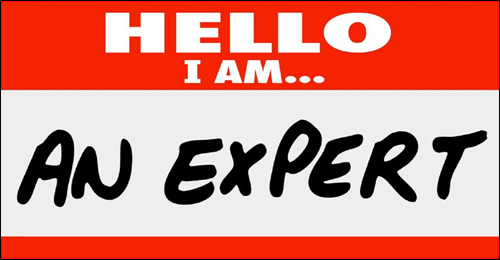
We live in an age of specialists and experts who identify themselves as at the top of their craft, experts like the financial wizards at JP Morgan Chase, who recently lost their company over $3 billion dollars. “Ooops,” they said. “We feel terribly stupid.” These are the same specialists who tanked the economy in 2008; past experience is no determinant of success.
What exactly makes someone a specialist or expert, and how is it that we’ve come to rely on them so completely? Day after day talking heads appear sounding confident and authoritative, like people whose opinions we can count on. Yet they’re dead wrong over and over again.
Our dependence on experts and specialists is due to our reliance on technology and science and our belief that technology and science is the answer to all problems. When it comes to saving souls, people may yet believe in God; when it comes to everything else, we believe in science and technology. Statistics, polling, surveys, tests are the new commandments we follow. Thus in every topic imaginable, we now find experts; child-rearing, politics, health, environment, agriculture, psychiatry, diet, exercise, auto-safety, energy production, and so forth.
It’s not that science and technology don’t deliver; in general both have created a longer living population, efficient communication and transportation, plus myriad things that make life “easier” and entertaining. Our confidence is largely based upon our daily immersion in a technological, scientific age that constantly delivers new innovation. However, science and technology have also raced ahead without due consideration of their effects on culture and society; we’ve created systems that are too fast for human judgment to control. The economic sector is one such system.
Finance, particularly speculation in stocks and investments is not a science, despite great efforts to make it appear that way. The reality is that a variety of approaches and techniques can be employed to make a profit, much of it based upon subjective guess-work. However trading is now dependent on technology, executed in real time via computer in milliseconds; the human element is often completely removed. For the largest trades, automated computer analysis and order-executing programs have replaced human judgment. This fact not withstanding, stock specialists and experts continue to promote themselves and sell investing as a science. Such posturing, and that’s all it is, provides grist for the business-as-entertainment-news mill, but little in the way of meaningful information. Sadly, people like Jim Cramer continue to attract investors to the Wall Street casino, which explains why the charade of experts continues. Any pyramid scheme needs a steady supply of new cash, and that’s what all the experts are about, sucking in new money.
Finance is not the only realm of specialist-as-ignoramus. How is one to ferret out truth or honesty amid the din of the deluded? As the world grows in complexity, it becomes harder to sort, sift and separate good information from bad. We are swamped by too much data and tend to listen to those with whom we agree. Public discourse has devolved to 140-character tweets. Relying on experts seems to be the only rational course of action, but in doing so we are often like lemmings following the leader off a cliff. Forget the experts; the solution is to trust ourselves and our own capacity to learn, accept responsibility for decision-making in our own lives, and not be afraid.